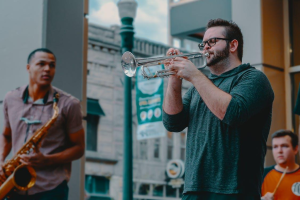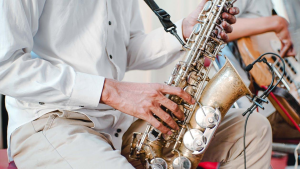Music production is an art that takes years of practice. As a beginner, there are some mistakes you need to avoid, so they don’t become a habit.

9 Facts You Didn’t Know about Jazz
But if you think jazz music is tough to appreciate, here are 9 facts about jazz that will help change your perception of the genre.
As for jazz lovers, you likely haven’t come across most of these facts, so they’ll make you appreciate jazz even more.
1. Jazz Came from Pop
These days, jazz is the music of the cultured, intellectual, and elite, but this wasn’t always the case. Most people think that jazz originated from the blues. While this isn’t entirely wrong, they forget that jazz was a combination of early 20th century blues, ragtime, European chamber elements, and marching band music.
2. The Origins of the Word “Jazz” are Unknown
No one knows exactly where the word “jazz” came from. However, most agree that it used to be a slang word, spelt in various ways like jass, jaz, and jas. Some say that the term came from baseball, where it was used to describe verve and fighting spirit.
3. Jazz Performers Use Secret Signals to Communicate on Stage
This is one of the most shocking facts about jazz for non-performers and even amateur musicians. Jazz music is complex, and with so much going on on-stage, jazz musicians devised non-verbal cues to communicate with each other.
They may nod to indicate the end of their solo, or point to their head at the end of a section to tell their band-mates to play the “head”, main melody, or chorus of the song. It’s fun to spot these cues and secret signals at a live performance, so keep an eye out next time you get the chance.
4. Jazz Is Making a Mainstream Comeback
Jazz has inspired many top musicians and artists over the decades, and now it is becoming popular once again. Jazz musicians and artists are becoming mainstream, while popular mainstream artists are fusing jazz in their music.
For example, Thundercat is an up-and-coming Grammy-winning musician, who dabbles in acid jazz and won a Grammy for his Progressive R&B album in 2021. Even top artists like Kendrick Lamar and Esperanza Spalding are fusing their music with jazz.
Flying Lotus, a popular and highly experimental producer, rapper, and DJ, is also bringing jazz back with his music. (Bonus fact: he is jazz legend John Coltrane’s nephew.)
The most popular sub-genres being adopted by modern artists these days include hot jazz, acid jazz, world jazz, and hip-hop-infused hybrids.
5. The Clarinet Was More Popular Than the Saxophone
When most people think of jazz today, the image of a sax players comes to mind. The saxophone is synonymous with the perception of jazz, but this wasn’t always the case. Before the saxophone, the clarinet was the popular choice and a dominant instrument for jazz music.
It was popularly known as the “licorice stick” in jazz terms, and was the defining instrument of the swing era. In fact, when the saxophone first entered the jazz scene, most jazz musicians did not appreciate its sound.
6. Jazz Is Among the Most Free-Flowing & Hybrid Forms of Music
The spontaneity and free-flowing and -spirited nature of jazz music makes it one of the most, if not the most hybrid forms of music. It has delivered many contemporary sub-genres like soul jazz, acid jazz, free jazz, etc.
Not only this, jazz has also introduced many different styles of music over the last century like swing, gypsy jazz, Latin jazz, big band, bebop, bossa nova jazz, and dixieland.
7. Jazz Has Influenced Many Dance Styles in America
Before jazz, social dancing in America was limited to folk dancing or classic waltz and tango. When jazz took over in the 1920s, it took social dancing to new heights. Public music became common and jazz made its way into the dance halls of America.
The expressive music inspired expressive dancing, which continually gave birth to new dance styles. Dance styles like the trot, Argentine tango, black bottom, Charleston, and many more became popular in American dance halls because of jazz music.
8. Listening to Jazz Is Healthy in Many Ways
Perhaps one of the best facts about jazz music is that listening to it can boost immunity, creativity, productivity, learning, and stress relief. The infectious sounds of jazz activate theta brain waves in humans.
These theta waves travel at a frequency between 4-8 Hz, and are the most creative brain waves we produce. They allow us to process information, form memories, discover new insights, and find solutions to problems that were previously unresolved.
If you have ever had a “eureka!” moment, it was likely the result of theta waves in your brain. Jazz is also considered to have the same restorative effect on us as complete silence does, allowing us to be more productive.
Jazz can even reduce stress and anxiety effectively, with similar efficacy as a full-body massage. Most importantly, however, listening to jazz for about 30 minutes can boost our immunity.
It improves your body’s immunoglobulin A levels, which allow it to combat and prevent nasty infections from making you ill.
9. “Hipster” Originated from a Jazz Term
There are many unique jazz terms and you’ve probably heard a few like “boogie” and “scat”, which was popularized by none other than the “Queen of Jazz”, Ella Fitzgerald.
But did you know that the word “hipster” has roots in a unique jazz term?
You’ve likely heard jazz musicians being referred to as “cool cats” or “jazz cats,” but another popular term used to describe a cool and knowledgeable “cat” in the 1930s was “hep.”
There were many “hep cats” or “hepsters” in the jazz scene during the 1930s, and this is where the term “hipster” comes from.
We hope these 9 facts about jazz helped change your perception of the genre, made you think, and sparked a desire to play or listen to jazz. If you are interested in learning how to play like the cool cats, you might want to check out The Young Musician Music Institute in Abu Dhabi, U.A.E.
From music theory lessons, and instruments training, to performance master classes, singing classes, and more, we’ve got a wide range of music certified courses available for musicians of all ages.
We can teach you how to express yourself with jazz instruments of all kinds.
Get in touch with us today to start your musical journey with music classes in Abu Dhabi, U.A.E., or leave a message at [email protected] with your contact details and we’ll get back to you.



